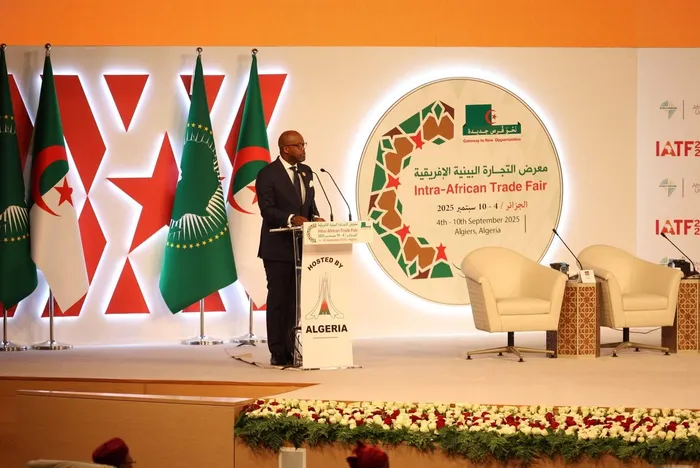
Wamkele Mene, Secretary General of the AfCFTA Secretariat, speaking during the opening of the 2025 Intra-Africa Trade Fair (IATF2025) held in Algeria.
Image: Supplied
The head of the African Continental Free Trade Area (AfCFTA) agreement has made an impassioned plea for a unified air transport market in Africa as a means for deeper integration across the continent.
Currently, the continent has no Pan-African airline that traverses the length and breadth of Africa, making it an elaborate and exorbitant endeavour to travel within the continent.
Wamkele Mene, Secretary General of the AfCFTA Secretariat, on Thursday identified air travel as one of the four challenges that still hinder seamless connectivity across the African continent.
Mene was speaking at the opening of the 2025 Intra-Africa Trade Fair (IATF2025), held in Algeria, where delegates gathered to celebrate significant milestones in African trade.
“First, integration is not only about trade rules; it is also about connectivity. Too many delegates here today had to transit through Europe to reach Algiers. That must change. We must accelerate the implementation of the Single African Air Transport Market.
“Opening Africa’s skies will lower costs, expand passenger and cargo services, and bring our economies and our people closer together. At the same time, investment in trade corridors, logistics hubs, and digital infrastructure must remain a top priority, so that our agreed rules translate into real opportunities on the ground.”
Mene’s sentiments were also shared by the President of Algeria, Abdelmadjid Tebboune, who challenged the countries to deepen economic ties by increasing trade flows to drive growth, create jobs, and shield the economies from effects of current global geopolitical events.
Tebboune stressed the need to enhance connectivity across the continent by addressing infrastructure gaps that will facilitate Intra-African trade.
He highlighted Algeria's efforts to address these shortcomings through several major structural mega-projects benefiting the continent, including the Trans-Saharan road, the gas pipeline linking Algeria and Nigeria, and the Trans-Saharan fiber optic backbone project, as well as launching air and maritime connections between African capitals, opening branches of Algerian banks in several African countries, among other projects.
"The profound lack of transport, energy, communication, and financing infrastructure affecting the African continent should not weaken our determination but rather serve as additional motivation to mobilize our collective capacities and transform our continental reality into a success story in terms of development,” Tebboune said.
The IATF - which is organised by the African Export-Import Bank (Afreximbank), in collaboration with African Union Commission and AfCFTA Secretariat - aims to increase intra-African trade and showcase the investment opportunities across this region and the continent.
More than 2 000 exhibitors, including businesses from the African continent and globally, are showcasing their goods and services to the visitors and buyers while exploring opportunities and exchanging information.
This is projected to translate into over $44 billion in trade and investment deals.
Mene also announced that the AfCFTA Adjustment Fund will be officially launched during the IATF2025. This initiative is geared towards addressing immediate financial challenges faced by nations and businesses as they adapt to the evolving economic landscape shaped by the AfCFTA.
Meanwhile, the deputy chairperson of the African Union Commission, Selma Malika Haddadi, noted that Africa contributes only 2.9% to global trade.
Haddadi said while Intra-African trade still represents a small fraction of the continent’s overall trade, it has been steadily increasing, expanding by 27% between 2017 and 2023.
“Our internal trade can be a powerful agent for industrialisation. Indeed, unlike our international trade, Intra-African trade is mainly driven by manufactured products. While Africa’s exports outside the continent only constitute 20% of manufactured goods, 45% of trade between African countries comprises manufactured goods,” she said.
“Despite its potential, Intra-African trade still represents a mere 15% of total African trade. This imbalance is not only the result of an unfair international trade regime. It is also the result of choices we have made, and therefore choices we have the power to change. Intra-African trade is and should be our point of focus.”
BUSINESS REPORT